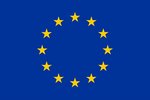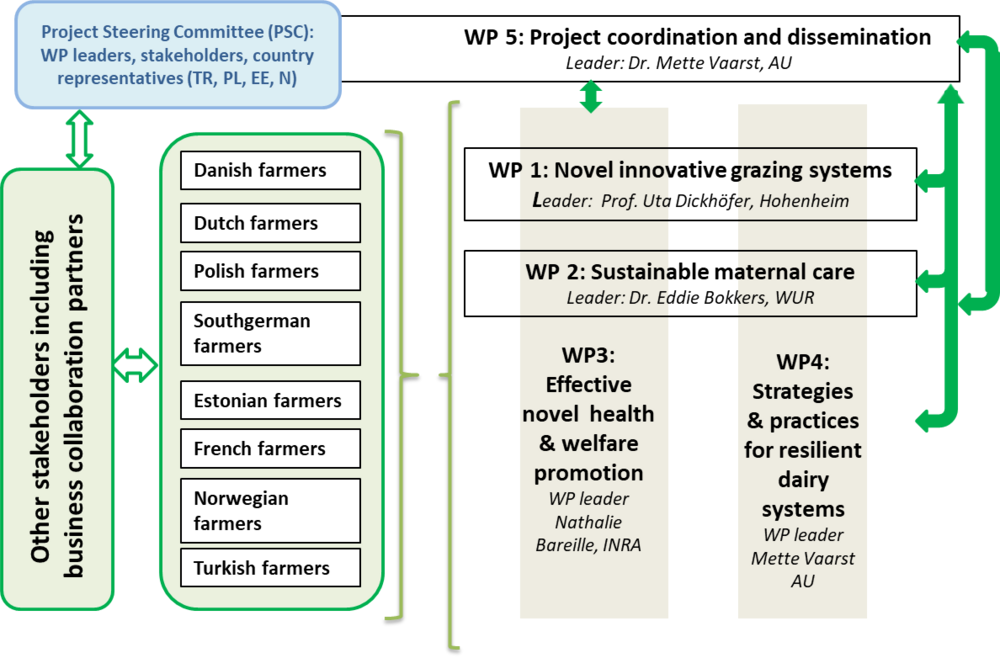Work packages
WP 1
WP1 aims at developing innovative, regionally adapted grazing systems that are robust to variable weather conditions, increase production of forages as protein sources in dairy cow feeding, and allow for co-grazing of animals of different age groups.
It uses the methods of semi-quantitative interviews combined with spot-sampling of pasture, animal, and farm characteristics; on-farm and on-station grazing trials testing the effects of innovative grazing systems on e.g. yield, nutritional quality, and botanical composition of pasture vegetation as well as the grazing behaviour, forage (protein) intake, milk quality, and productive and reproductive performance of animals. Grazing management decisions shall be based on a combination of animal and vegetation indicators that are identified and tested within the frame of the project.
WP2
WP2 aims to develop and test methods to strengthen the dam-calf bond to ensure maternal care of the calf when kept with the dam in the herd at pasture, and to facilitate the de-bonding process at weaning, while minimizing negative consequences for the cow and calf, documented through multi-faceted animal health and welfare based indicators, which will be developed and tested in a parallel running PhD project.
On-farm studies focusing on different dam-calf rearing systems will be conducted. The impact of these rearing systems on the health and welfare of cows and calves will be comprehensively assessed in terms of a range of behavioural, clinical, immunological, and neuroendocrine measures. The same health and welfare assessment protocols will be used across experiments and partners/countries within WP2. Results obtained in WP2 will also contribute to the sustainability analysis of dam-calf-rearing-systems in WP4, by the end of the study. Phase 1 consists of observational studies on existing rearing practices, whereas in Phases 2 and 3 controlled experimental designs will be implemented to test different dam-calf rearing strategies.
WP 3
WP3 aims to assess, document, and analyse consequences of different management systems (rearing different age groups together, or implementing novel strategies to minimize disease and promote health), in grazing-based dairy systems, on animal health and welfare, as well as use of antibiotics and anthelminthics. The focus will be context-dependent, although GIS, calf diarrhoea, mastitis, and fertility are currently identified as major problem areas across contexts. This WP will build on clinical examinations, weight, animal health and welfare assessments, disease treatment data, milk quality data, GIS larval exposure estimation using an expert system, conduct of laboratory analyses.
WP 4
WP4 aims at exploring and analysing the farmers’ perceptions, visions, barriers, as well as social and daily practices related to dam-calf rearing, innovative grazing strategies, and improvements of animal health and welfare to reduce the use of antibiotics and anthelminthics, throughout the project phases and the transformation into novel systems. Furthermore, WP4 aims at assessing the environmental and economic sustainability of dam-calf rearing, using collected economic and husbandry data. This WP will primarily be based on semi-structured qualitative interview methods, which form the basis for more target directed questions, which will be analysed on country levels and across countries to identify and characterize dairy system types and demonstrate the wide range between different contexts. Anthropological (e.g. participant observation) and social scientific methods, and participatory videoing. Sustainability assessment will be used in different ways to evaluate the novelty of systems, especially the cow-calf systems and the new grazing strategies. At the end of Phase 3, economic modelling will be used to assess the potential effects of these systems.
WP 5
In WP5, the reports, disseminations and news are made, and the project is coordinated through monthly communications on email and skype between Steering Group members.

